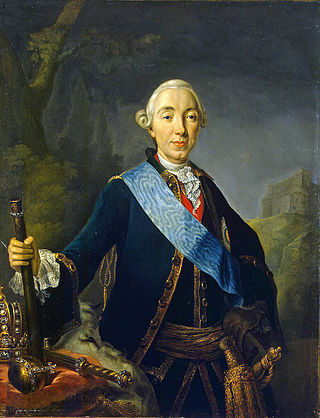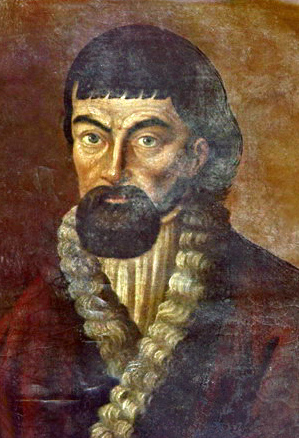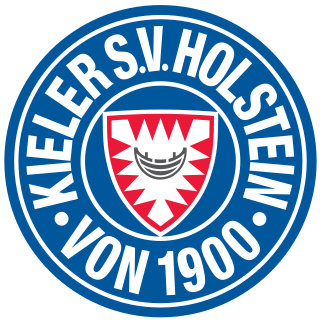
Alexander III was Emperor of Russia, King of Congress Poland and Grand Duke of Finland from 13 March 1881 until his death in 1894. He was highly reactionary in domestic affairs and reversed some of the liberal reforms of his father, Alexander II. This policy is known in Russia as "counter-reforms". Under the influence of Konstantin Pobedonostsev (1827–1907), he opposed any socio-economic moves that limited his autocratic rule.

The House of Romanov was the reigning imperial house of Russia from 1613 to 1917. They achieved prominence after Anastasia Romanovna married Ivan the Terrible, the first crowned tsar of all Russia. Nicholas II and his immediate family were executed in 1918, but there are still living descendants.

Catherine II, most commonly known as Catherine the Great, was the reigning empress of Russia from 1762 to 1796. She came to power after overthrowing her husband, Peter III. Under her long reign, inspired by the ideas of the Enlightenment, Russia experienced a renaissance of culture and sciences, which led to the founding of many new cities, universities, and theatres, along with a large-scale immigration from the rest of Europe and with the recognition of Russia as one of the great powers of Europe.

Peter III Fyodorovich was Emperor of Russia from 5 January 1762 until 9 July of the same year, when he was overthrown by his wife, Catherine II. He was born in the German city of Kiel as Charles Peter Ulrich of Schleswig-Holstein-Gottorp, but he was a grandson of Peter the Great and a great-grandson of Charles XI of Sweden.

Kiel is the capital and most populous city in the northern German state of Schleswig-Holstein, with a population of 246,243 (2021).

Count Alexey Petrovich Bestuzhev-Ryumin was a Russian diplomat and chancellor. He was one of the most influential and successful diplomats in 18th-century Europe. As the chancellor of the Russian Empire was chiefly responsible for Russian foreign policy during the reign of Empress Elizaveta Petrovna.

Yemelyan Ivanovich Pugachev was an ataman of the Yaik Cossacks and the leader of the Pugachev's Rebellion, a major popular uprising in the Russian Empire during the reign of Catherine the Great.

The Order of St. Andrew the Apostle the First-Called is the highest order conferred by both the Russian Imperial Family and by the Russian Federation . Established as the first and highest order of chivalry of the Russian Tsardom and the Russian Empire in 1698, it was removed from the honours system under the USSR before being re-established as the top Russian civil and military order in 1998.

Grand Duchess Maria Alexandrovna of Russia was the fifth child and only surviving daughter of Alexander II of Russia and Marie of Hesse and by Rhine; she was Duchess of Edinburgh and later Duchess of Saxe-Coburg and Gotha as the wife of Alfred, Duke of Saxe-Coburg and Gotha. She was the younger sister of Alexander III of Russia and the paternal aunt of Russia's last emperor, Nicholas II.

The House of Orlov is the name of a Russian noble family which produced several distinguished statesmen, scientists, diplomats, and soldiers. The family first gained distinction in the 18th century through the achievements of five Orlov brothers, of whom the second eldest was Catherine the Great's paramour, and two younger brothers were notable military commanders.

Charles Frederick, Duke of Schleswig-Holstein-Gottorp was a Prince of Sweden and Duke of Schleswig-Holstein-Gottorp and an important member of European royalty. His dynasty, the Dukes of Schleswig-Holstein-Gottorp, were a cadet branch of the ancient House of Oldenburg, which at that time was ruling Denmark-Norway. His mother was a sister of Charles XII of Sweden. Charles Frederick married a daughter of Peter the Great and became the father of the future Peter III of Russia. As such, he is the progenitor of the Russian imperial house of Holstein-Gottorp-Romanov and the patrilineal ancestor of all Russian emperors starting with Peter III, except for Catherine II.

Grand Duchess Anna Petrovna of Russia was the eldest daughter of Emperor Peter I of Russia and his wife Empress Catherine I. Her younger sister, Empress Elizabeth, ruled between 1741 and 1762. While a potential heir in the reign of her nephew Peter II, she never acceded to the throne due to political reasons. However, her son Peter III became Emperor in 1762, succeeding Elizabeth. She was the Duchess Consort of Holstein-Gottorp by marriage. She was born in Moscow and died in Kiel in her youth, at the age of 20.

Kieler Sportvereinigung Holstein von 1900 e.V., simply as KSV Holstein or Kieler SV Holstein, commonly known as Holstein Kiel, is a German association football and sports club based in the city of Kiel, Schleswig-Holstein. From the 1900s through the 1960s, the club was one of the most dominant sides in northern Germany. Holstein appeared regularly in the national playoffs, winning their most important title, the German football championship in 1912, and finishing as vice-champions in 1910 and 1930. Holstein also won six regional titles and finished as runners-up another nine times. They remained a first-division side until the formation of the Bundesliga in 1963.

The Imperial Order of Saint Alexander Nevsky was an order of chivalry of the Russian Empire first awarded on 1 June [O.S. 21 May] 1725 by Empress Catherine I of Russia.

Elena Pavlovna was a grand duchess of Russia as the daughter of Paul I, the Russian emperor, and later became the Hereditary Grand Duchess of Mecklenburg-Schwerin as the wife of the Hereditary Grand Duke Frederick Louis (1778–1819).

The Duchy of Holstein was the northernmost state of the Holy Roman Empire, located in the present German state of Schleswig-Holstein. It originated when King Christian I of Denmark had his County of Holstein-Rendsburg elevated to a duchy by Emperor Frederick III in 1474. Members of the Danish House of Oldenburg ruled Holstein – jointly with the Duchy of Schleswig – for its entire existence.
Holstein-Glückstadt or Schleswig-Holstein-Glückstadt is the historiographical name, as well as contemporary shorthand name, for the parts of the duchies of Schleswig and Holstein that were ruled by the Kings of Denmark in their function as dukes of Schleswig and Holstein, thus also known as Royal Schleswig-Holstein. Other parts of the duchies were ruled by the Dukes of Schleswig-Holstein-Gottorp. The territories of Holstein-Glückstadt are located in present-day Denmark and Germany. The main centre of administration was Segeberg and from 1648 Glückstadt on the River Elbe.

Christoph Prinz zu Schleswig-Holstein was the head of the House of Schleswig-Holstein-Sonderburg-Glücksburg and, by agnatic primogeniture, of the entire House of Oldenburg between 1980 and 2023. Traditionally he would have been the eighth Duke of Schleswig-Holstein and Duke of Glücksburg, styled as His Highness. He was a male-line descendant of Christian I of Denmark, and was also descended cognatically from numerous more recent monarchs, including Queen Victoria of the United Kingdom, Emperor Alexander II of Russia and several more recent Danish kings. His paternal grandmother was Princess Marie Melita of Hohenlohe-Langenburg, a great-granddaughter of Queen Victoria.

Duke Constantine Frederick Peter of Oldenburg was a son of Duke Peter Georgievich of Oldenburg and his wife Princess Therese of Nassau-Weilburg Known in the court of Emperor Nicholas II as Prince Constantine Petrovich Oldenburgsky, he was the father of the Russian Counts and Countesses von Zarnekau.

Princess Catherine of Schleswig-Holstein-Sonderburg-Beck, was a German noblewoman and member of the House of Schleswig-Holstein-Sonderburg-Beck. Through her marriage she became Princess Baryatinskaya, being mostly known as Princess Ekaterina Petrovna Barjatinskaya.


















